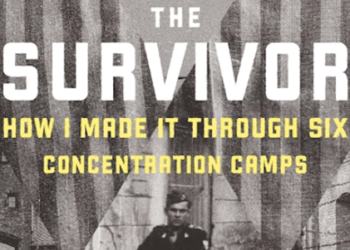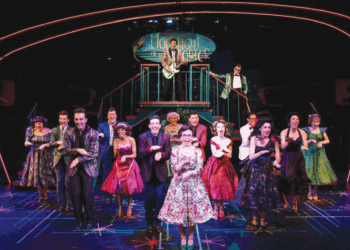Gritty war film follows journey of a tank crew blasting its way through southern Lebanon in 1982
By MICHAEL FOX
Even if one did not know going in that Samuel Maoz’s stunning war movie, Lebanon, was based on his own chaotic, harrowing experience inside a tank in 1982, the attention to detail clearly conveys first-hand knowledge.
By the last reel, the emotional wounds that Maoz was unable to confront and depict onscreen for 25 years are just as palpable. What we can’t see, or fully extrapolate, is his prewar mindset and postwar shock.
“I can remember my teacher, in the class with the number on her arm, shouting hysterically that we need to fight for our country and we need to die for it if necessary because everybody wants to terminate us,” Maoz recalls. “I didn’t feel that everybody wants to terminate me. All that was in my head when I was 18 was the Tel Aviv beach and girls. But in a way we were brainwashed.”
Lebanon opens Sept. 3 at the Lagoon Cinema in Uptown.
Maoz, whose mother is a Holocaust survivor, can’t forget the disorientation and alienation he felt when he returned from Lebanon.
“To come back from war in the beginning of the ‘80s with your two hands, two legs, 10 fingers, without any burn marks on your skin and to complain that you had problems inside you, it was almost unforgivable,” he said. “They told us, ‘Say thank you that you are alive. We were in the camps.’ I remember that we hated the camps less because of what happened there but more because they used them against us all the time. It was so strong that even now when I’m talking, and after talking [about the movie] for six, seven months, I still feel like I’m a bad boy.”
Lebanon opens with a shot of an Israeli tank in a pastoral setting, then depicts the hellishness of war. (Photo: Courtesy of Sony Pictures Classics)
The 48-year-old Maoz has been continuously in the limelight, with even Hollywood pursuing him, since Lebanon won the top prize at the Venice Film Festival last fall. In an interview at a Nob Hill hotel during his May visit to the San Francisco International Film Festival, the tall, lanky director explained how conflict defines each generation of Israelis — and vice versa.
“Our parents, our teachers, many of them came from Europe, and when they had their wars they thought that this was their only choice,” Maoz says. “They thought that everybody wanted to terminate them, so they had all the motivation that someone needs. And they won, against all [odds]. When my generation had its war, the war was so-so. We didn’t win, but we didn’t lose; we just made a total mess.”
A quarter of a century later, the attitude of Israeli youth has evolved dramatically, he observes without judgment.
“When the new generation — the YouTube, the iPhone, the global generation — had their war in 2006 with the best army [in terms of] technology and equipment, they lost. Because they don’t have any more motivation to fight. They feel a bit that they are fighting for their parents’ ideas, [but] it’s an Internet world and they can see normal life everywhere, and they also want normal life, without fear.”
Samuel Maoz (in a photo from 1982): We didn’t win, but we didn’t lose; we just made a total mess. (Photo: Courtesy of Sony Pictures Classics)
Maoz relates that some older Israelis worry that recent homegrown movies that expose the cost and pointlessness of war, notably Lebanon, Beaufort and Waltz with Bashir, will dissuade teenagers from going into the army. But younger Israelis are demanding the truth, he says, even as their positive reactions to Lebanon suggest they respond to it as a personal, rather than a political, film.
“Every antiwar film is in a way a politically correct film,” Maoz asserts, “because even if you want to change people’s opinions or way of thought, you can’t do it just by talking to their heads. If Lebanon speaks to one mother’s heart, that is more important than to please one hundred intellectual journalists sitting in Europe and expecting me to say the right slogans. And you know what, in the end, this is realpolitik. Realpolitik is not slogans. Realpolitik is trying to achieve a kind of progress.”
***
Lebanon opens Sept. 3 at the Lagoon Cinema in Uptown.
Michael Fox is a film critic based in San Francisco.
The trailer is below. (CAUTION: Viewer discretion is advised.)



















